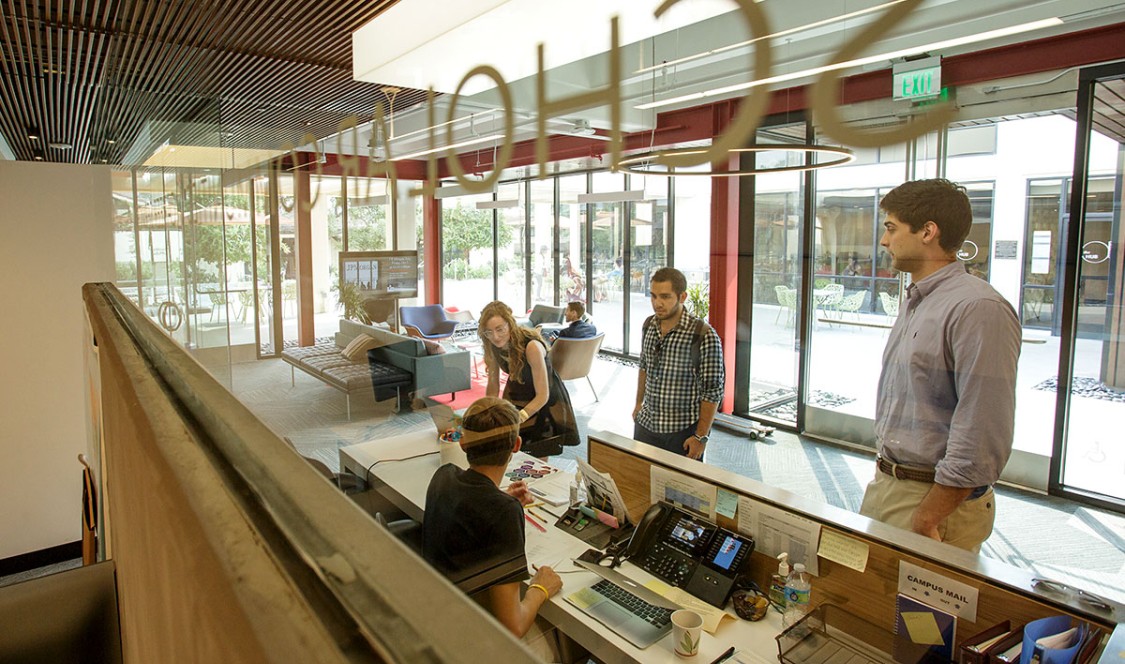A CMC education provides the foundation of a thoughtful, productive life and roles of responsible leadership. The return on CMC values is incalculable. The College just took another major step forward to help students translate their many strengths and interests into real world opportunities.
In order to give students every advantage as they embark on their lives after college, CMC recently launched a new Student Opportunity Center -- housing, broadening and integrating Career Services, the Robert Day Scholars Program external relations team, and providing dedicated support for the College’s scholar communities. The Center is also a key venue for mentoring and advising by dedicated staff, alumni, and parents.
“Alumni and parents are connected to the Center through many programs,” says Michelle Chamberlain, CMC’s Associate Vice President and the new Dean of Student Opportunities. “First, we are seeking ‘experts-in-residence’ for each of the interest clusters to chat with CMC students about their careers and respective industries, as well as informing our career counselors of the latest trends and recruiting opportunities. Additionally, we interact with alumni and parents through networking treks around the country, our soon-to-start job shadowing program, and other activities.”
In addition to Chamberlain who leads the Center, Kevin Arnold serves in an expanded role as Executive Director of Scholar Communities. A search is underway for a new Director of Career Services.
Speaking in his capacity as Executive Director of Scholar Communities, Arnold says that he’s excited about the value generated by combining common interests and backgrounds with vertical and horizontal connecting of scholars, particularly for first year students.
“There are so many great resources at CMC that can be better utilized by building an additional network of connections within and among Scholar Community cohorts,” he says. “Ultimately, I expect every student at CMC to benefit from the increased access, awareness, and resources that the Student Opportunity Center offers.”
The Center is situated in a remodeled Frazee, across from the Hub. The venue is designed with students in mind, complete with open offices, flexible spaces, additional interview rooms, outdoor seating, and an architectural feel that creates a strong connection to campus.
In addition to its own services, the Center collaborates with faculty, institutes, athletics, global education, and CMC’s new CARE Center to help students translate their interests, especially in leadership and complex problem-solving, into meaningful and exciting real-world opportunities.
To that end, the Center’s debut spurs many programmatic enhancements. Students can look to a re-imagined counseling model, organized by interest clusters, along with a first-year counseling program that builds upon the relationships established during the Welcome Orientation Adventures (WOA) experience. Other student-focused improvements include an expanded career fair, transition to a new online recruiting system (Handshake), more networking trips, and extended drop-in/office hours.
“Our previous counseling model, which was aligned by major, forced career counselors to be generalists,” Chamberlain says. “For example, the counselor assigned to all philosophy majors might counsel students interested in technology, law, or consulting, which is a broad landscape to cover. As a result, aligning our counseling by nine of the most popular industries, which we call interest clusters, counselors can better meet the specific needs of our students.”
Additionally, Chamberlain says, to encourage exploration and ensure that no student feels too hemmed in by the clusters, the Center has initiated a freshman counseling program that reconvenes WOA groups, encourages students to affiliate with multiple-interest clusters in building their Handshake (formerly ClaremontConnect) profiles, and has introduced a new exploratory appointment option designed to provide a brief overview of the opportunities available in each cluster.
“On the Career Services side, we want to encourage more exploration amongst the students, and also interact with CMCers earlier in their four-year journey,” Chamberlain says.
Regarding Center plans for the scholar communities at CMC, Arnold says that they have started to host lunches for each of the communities.
“These lunches have served to introduce scholars to one another, share information about campus resources including those within the Center and, most importantly, to solicit ideas on how the Center can best support these students’ interests and success,” Arnold says. “There are also ongoing meetings among the many CMC staff that support the scholar communities to share information and to explore ways to improve procedures for selection, funding, communication of requirements, programming, and student progress.”
A formal dedication event for the Center will be held early in the spring semester.

